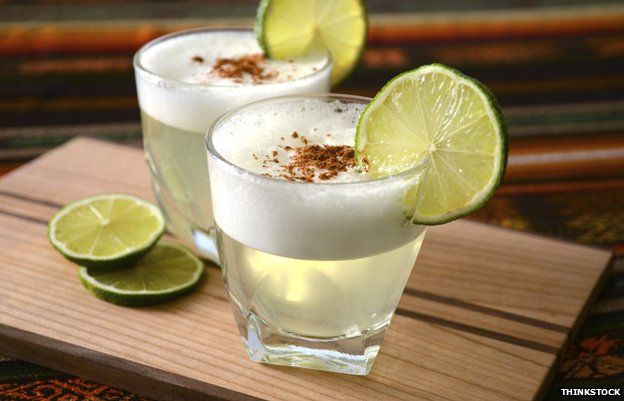Who, what, why: Is it safe to drink cocktails with raw egg?
- Published

The current craze for cocktails includes many drinks that feature raw egg. Is drinking one dangerous?
In drinks like a Pisco Sour, cocktail makers use the white of an egg to give the drink a foamy head. You can also find it in a Pink Lady, Ramos Gin Fizz or Clover Club.
But there's been years of concern over the presence of salmonella bacteria in eggs.
Infection causes diarrhoea, abdominal pain and cramps, headache, nausea, vomiting and fever. Young people, the elderly, pregnant women and those with compromised immune systems are most susceptible.
But the prevalence of salmonella in eggs has fallen considerably on both sides of the Atlantic.
In the UK, Kevin Coles of the British Egg Information Service says there is never a cast-iron guarantee of safety when it comes to raw eggs in food or drink, but points to the industry's red lion mark.
"Any egg can contain salmonella but it is more or less a thing of the past in the UK. Eggs with the red lion mark have all come from chickens vaccinated against salmonella."
Most supermarkets only sell red lion eggs but bars and restaurants can buy eggs from wherever they want - there are no legal requirements. And the Food Standards Agency doesn't advise against people consuming raw eggs if they so wish.
"However for vulnerable groups (including the elderly) we suggest they should avoid consumption of raw/lightly cooked eggs because of the risk of salmonella," says the agency.
Many cocktail books would offer the same advice regarding raw egg use. And there are plenty of cocktail mixologists who choose not to use them.
Alessandro Palazzi, head barman at the Dukes Bar in London, says there is no need to use eggs in cocktails at all. Palazzi avoids them, even with classic concoctions.
"Raw eggs were used in the old days to make classics like the whisky sour, but a lot of people don't use them now, including us. It's a lazy thing to do - like a chef adding flour to a sauce to make it thicker."
He says a good barman can create classic cocktails without using eggs at all.
"The only difference is the longevity of the froth. If you know how to shake a cocktail properly and use the right ingredients you can create the same effect."
In the old days bar staff used more basic ingredients. "They make drinks slimy and too thick. I think some people use them to hide the taste of cheap, bad ingredients."
And he doesn't approve of the raw egg substitutes that some bars use. "The smell is awful. I tried it only once then threw it away."
But eggs have always been a part of cocktails, argues Dale DeGroff, founder and president of The Museum of the American Cocktail.
Many might think that cocktails were an American invention, but DeGroff explains that the roots are in fact in the UK. "Many of those recipes originated from tavern fare in England - flips, nogs and possets." They're traditional drinks composed of warm spiced ale, with sugar, spirit and eggs.
DeGroff questions the logic of health fears over raw eggs in drinks when they are frequently used in food. "Shall we do away with eggs Benedict because the hollandaise sauce is prepared without cooking? It is a silly controversy created by nanny states."
But it's impossible to guarantee the safety of any drink containing raw egg.
The popular belief that either the alcohol or lemon or lime juice in a cocktail would instantly kill salmonella bacteria is not quite true, argues Dr Paul Wigley, from the University of Liverpool's Institute of Infection and Global Health.
"It is much harder to eliminate the risk of salmonella with alcohol because of the high protein content in eggs. You would need a very strong cocktail… and you would need to mix the cocktail and leave it to rest for a very long time.
"Lemon and lime juice would be more effective, but you would need to use a lot and leave it to sit for a very long time for there to be any reduction whatsoever. The best way to avoid the risk of salmonella in drinks is not to use raw eggs at all."
That's a position many risk-averse drinkers will take, whatever the cocktail traditionalists say.
Reporting by Alison Feeney-Hart.